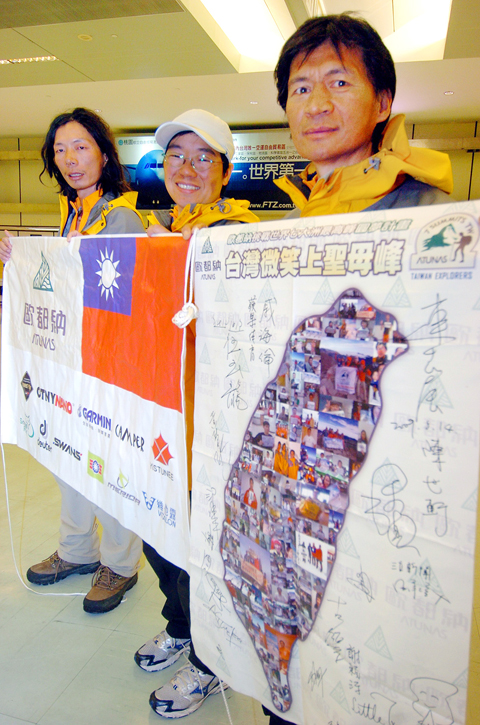Three Taiwanese climbers who scaled Mount Everest last week returned home from Bangkok yesterday, with all three ready for their next challenge.
Chiang Hsiu-chen (江秀真) and her fellow mountaineers received a hero’s welcome at Taiwan Taoyuan International Airport. Their success made Chiang the first Taiwanese woman to conquer the highest peaks on seven continents. It also marked the first time in 13 years that Taiwanese alpinists made it to the top of the 8,848m Mt Everest, said the Atunas Group, which organized the latest expedition.
Chiang, 39, has scaled the highest mountain in the world from both the north side and the south side of the peak, after completing the assault on Mt Everest’s summit last week from the south side, the more conventional route. She climbed the more treacherous north side 14 years ago.

PHOTO: CHU PEI-HSIUNG, TAIPEI TIMES
MISSION
Chiang, a mountain ranger at Yushan National Park, and the two male climbers — Wu Yu-lung (伍玉龍), a 49-year-old Bunun tribesman who is the leader of a rescue team, and 33-year-old Huang Chih-hao (黃致豪), who is doing postdoctorate research in electronic engineering at Colorado State University — reached the top of Mt Everest at 12:52pm on May 19.
In a brief interview with the Central News Agency at the airport, Chiang said she was looking forward to her next mission — developing a system to teach mountain climbing in Taiwan.
“Teaching and training [people] about mountain climbing is even more challenging than scaling Mt Everest,” she said. “I will try my best in the next 20 years to contribute to mountain-climbing in Taiwan, an island that boasts a number of high peaks.”
Wu said he would work two or three more years to save enough money to challenge the world’s third-highest peak in India.
Huang said his next challenge would be climbing one of the world’s highest mountains without the aid of bottled oxygen and Sherpa guides, and making a documentary about it.

Taiwan is stepping up plans to create self-sufficient supply chains for combat drones and increase foreign orders from the US to counter China’s numerical superiority, a defense official said on Saturday. Commenting on condition of anonymity, the official said the nation’s armed forces are in agreement with US Admiral Samuel Paparo’s assessment that Taiwan’s military must be prepared to turn the nation’s waters into a “hellscape” for the Chinese People’s Liberation Army (PLA). Paparo, the commander of the US Indo-Pacific Command, reiterated the concept during a Congressional hearing in Washington on Wednesday. He first coined the term in a security conference last

DEFENSE: The National Security Bureau promised to expand communication and intelligence cooperation with global partners and enhance its strategic analytical skills China has not only increased military exercises and “gray zone” tactics against Taiwan this year, but also continues to recruit military personnel for espionage, the National Security Bureau (NSB) said yesterday in a report to the Legislative Yuan. The bureau submitted the report ahead of NSB Director-General Tsai Ming-yen’s (蔡明彥) appearance before the Foreign and National Defense Committee today. Last year, the Chinese People’s Liberation Army (PLA) conducted “Joint Sword-2024A and B” military exercises targeting Taiwan and carried out 40 combat readiness patrols, the bureau said. In addition, Chinese military aircraft entered Taiwan’s airspace 3,070 times last year, up about

A magnitude 4.3 earthquake struck eastern Taiwan's Hualien County at 8:31am today, according to the Central Weather Administration (CWA). The epicenter of the temblor was located in Hualien County, about 70.3 kilometers south southwest of Hualien County Hall, at a depth of 23.2km, according to the administration. There were no immediate reports of damage resulting from the quake. The earthquake's intensity, which gauges the actual effect of a temblor, was highest in Taitung County, where it measured 3 on Taiwan's 7-tier intensity scale. The quake also measured an intensity of 2 in Hualien and Nantou counties, the CWA said.

The Overseas Community Affairs Council (OCAC) yesterday announced a fundraising campaign to support survivors of the magnitude 7.7 earthquake that struck Myanmar on March 28, with two prayer events scheduled in Taipei and Taichung later this week. “While initial rescue operations have concluded [in Myanmar], many survivors are now facing increasingly difficult living conditions,” OCAC Minister Hsu Chia-ching (徐佳青) told a news conference in Taipei. The fundraising campaign, which runs through May 31, is focused on supporting the reconstruction of damaged overseas compatriot schools, assisting students from Myanmar in Taiwan, and providing essential items, such as drinking water, food and medical supplies,